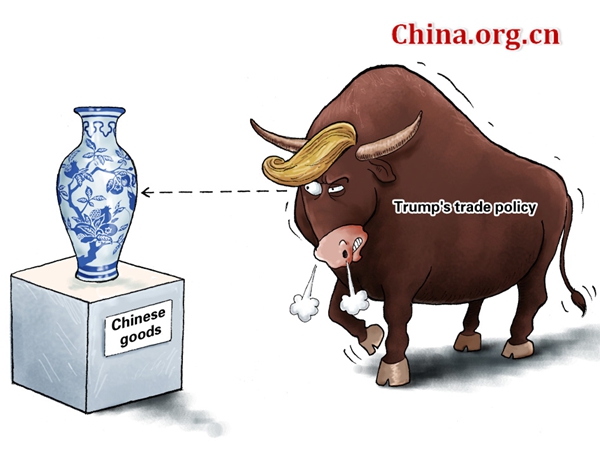Scholars say China can withstand 'trade war' with US
china.org.cn / chinagate.cn by Zhang Lulu, March 1, 2017 Adjust font size:
 |
Yang Xiyu, vice president of the Institute of Boao Forum for Asia, reminded the Chinese to be wary of a possible trade war or more intense trade frictions during a seminar in Beijing held by the China Center for International Economic Exchanges on Tuesday.
China currently comprises nearly 46 percent of the American trade deficit, much higher than when the U.S. and Japan had a trade war in the 1990s (Japan had about 25 percent of U.S. trade deficit then), thus Chinese should be wary of the trade war, he said.
Yang's argument was echoed by Li Xiangyang, a research fellow and director from the National Institute of International Strategy of the Chinese Academy of Social Sciences. Li said that though many in China argued that the two countries were too interdependent to have a trade war, China and the U.S. are not indispensable to each other. The United States could, for instance, import things from other countries instead of depending on China, especially given the excess production capacity across the world, he argued.
Yang said a trade war was what the U.S. president has had in mind for a long time, as President Trump has repeatedly vowed to slap big tariffs on China. But how the war would unfold depends on the responses of and interactions between the two countries.
"China has at least an equal say as the U.S. on the intensity and depth of the trade frictions between the two countries," Yang argued. "It depends on China's strategy and wisdom in responding to the frictions."
China should be more flexible on where it can afford to compromise and where the country can make no concessions at all, he said. He took an example of the U.S. asking China to increase imports of American agricultural products. He said China can agree to do that since the country is short on water and hence it would not hurt to import more produce from the U.S. But other issues like a sharp appreciation of the RMB would not be an option.
"If the two countries can make concessions to each other and follow the principles of win-win cooperation, China can withstand trade tensions and go through a war smoothly," said Yang.